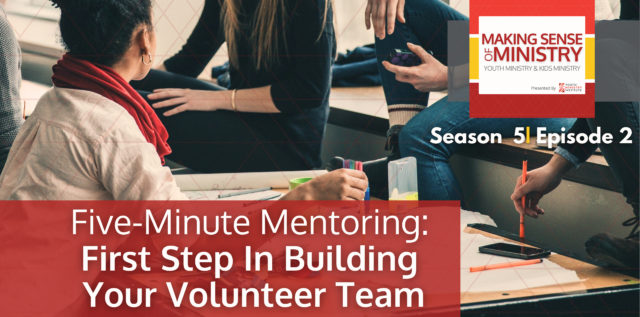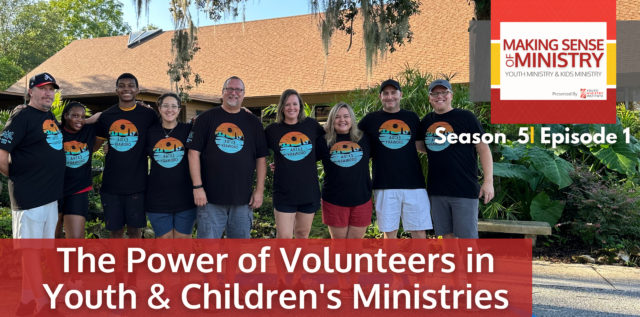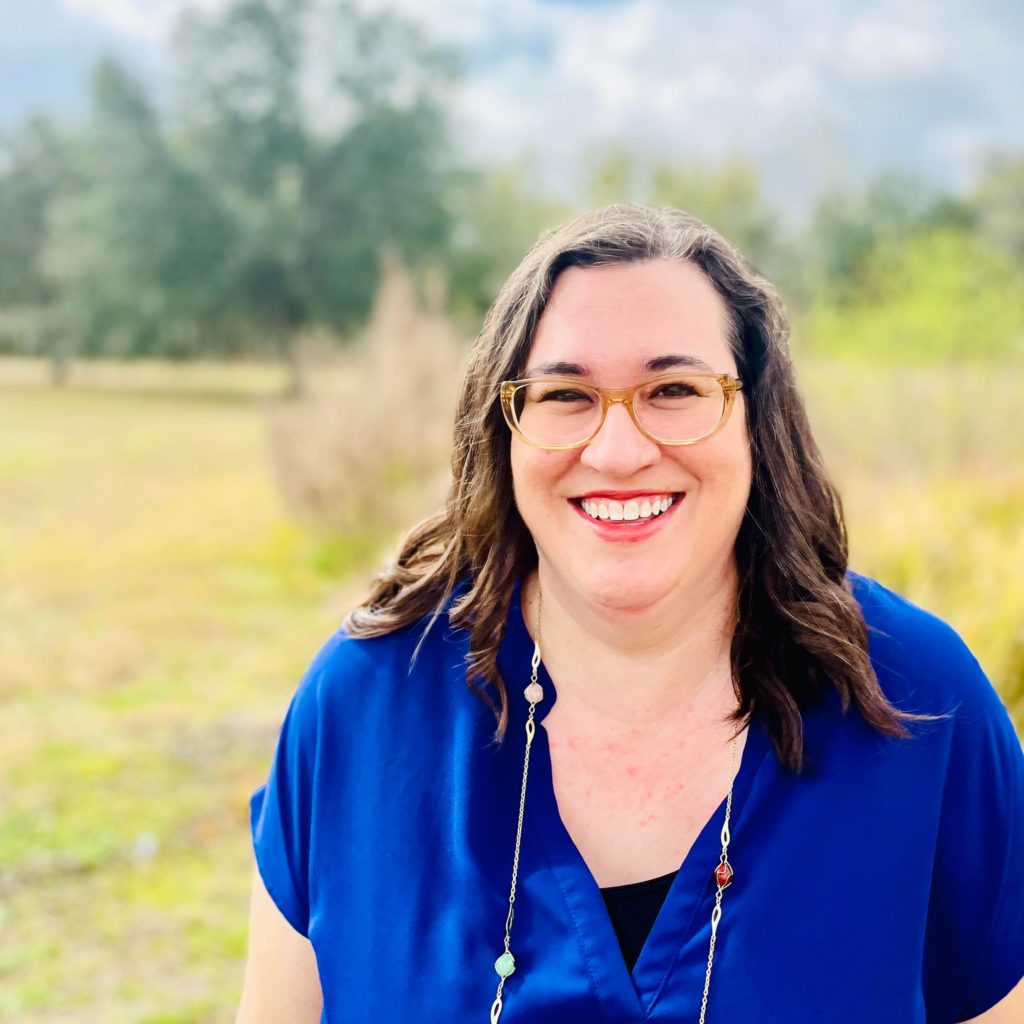The Making Sense of Ministry podcast is on all major platforms, including Spotify, Apple Podcast, and Audible.
In this episode, we walk through tales of memorable volunteers, the influences they wield on youth and children’s ministries, and the lessons we can glean from their stories. Ever been amused by a volunteer who does something quirky? Or marveled at a longtime volunteer who creates a ‘happy place’ of serving within the church?
As we round off this episode, we lean into the life cycle and retention of volunteers. We share a poignant story, a single unpleasant encounter that drastically reshaped our volunteer recruitment process. We then tap into the art of trusting our instincts for volunteer selection and tactfully guiding volunteers onward when the time is right. Tune in and be inspired by the immense power volunteers offer to our communities.
Resources Mentioned
Subscribe To Content Filled Emails
Find the Youth Ministry Institute on Facebook, Instagram, Twitter, or Linkedin.
Find Brian on Facebook, Instagram, Twitter,Support the show
Show Transcript
Brian Lawson: 0:00
Youth Ministry Institute original podcast. Welcome to the Making Sense Ministry podcast, a podcast designed to help you lead well ministry, transform your lives and impact generation. I’m Brian Lawson, back again with Kirsten Knox hey, kirsten.
Kirsten Knox: 0:17
Hey everybody, hey Brian.
Brian Lawson: 0:19
And we are excited to celebrate a new season, start a new season and we’ve got some great stuff to share. So I don’t know when our listeners are listening to this. Perhaps they’re listening to it shortly after they release it. But we just ended summer, yes, and I had a really cool experience, Kirsten. I want to share with you the I was had a really long day and I was exhausted, and I think we all know those days and those are the days when you’re out and about and you kind of hope you don’t see anybody. You know, I don’t know if you know these days- I got it yes. Yes. So my family and I, we were eating dinner at a restaurant, but it was like a quick service place so we were thought we could be in and out and no one would see us and we could be good. And we’re sitting there eating and then all of a sudden I see like a shadow hovering over to the right of myself. So I panic a little bit, wondering what a world’s happening. But then I look over and I see I see what is clearly a football player, right, so a high school football player. And then I look behind them and there’s this big group of high school football players that had come from practice it looks like you’re probably doing long summer practices right now and and he said Pastor Brian, and the whole time I’m like I don’t know if I know this person.
Kirsten Knox: 1:35
And I think I should cause.
Brian Lawson: 1:37
He knows who I am and I feel like at this point in time I’m supposed to know him, and so I wasn’t sure who he was. And he goes. Pastor Brian I, I know I hadn’t seen you in a while, but I just wanted to tell you. You were like the first person to tell me about Jesus and you were the one who really got me interested in faith and in Jesus and like here I am terrible day, don’t want to see anybody, and then hit with some incredible, you know gift from him to share that with me. I didn’t know who he was. I knew that I had to know him. I recognize like his mannerisms and he clearly knew me, and so I kept trying to remember who he was. So I’m trying to play it off like we do.
Kirsten Knox: 2:20
Yes, yes.
Brian Lawson: 2:23
But then I go home later and I looked through my Instagram feed and old pictures and I figure out who it was. So I hadn’t seen him in over four years.
Kirsten Knox: 2:31
Wow.
Brian Lawson: 2:31
And he was a little six sixth grader, just started seventh grade the last time I had seen him. So this time he’s middle of high school.
Kirsten Knox: 2:37
He’s grown up a lot. He looks different.
Brian Lawson: 2:40
He’s got a lot, yeah, long hair, everything’s very different, and so, but if it’s just a really cool experience, so then of course, I actually sent a message on Instagram with an old photo of him and it was just a cool experience to have him share that with you, with me, and yeah, so I hope our listeners have had that experience. Kirsten, have you ever had something like that happen before to you?
Kirsten Knox: 3:05
Yes, I have. I was trying to think back of the last time I received. It was during a graduation recently and someone when an old student was graduating and they had sent me a thank you card and had written things in it and I was like man, I had no idea that this had the thing. She mentioned some specific things that made a difference in her life and you’re like I thought they were impactful, but I had no idea at the level in which it was impactful for her. And it was again such a gift and I didn’t expect it. You know you get a thank you card from graduation and you think it’s the standard. Yeah, I thank you blah blah blah for your, and it was definitely a lot deeper than I anticipated. So, definitely in those because I’m like there’s a lot of times we do ministry without getting those thank yous or even just wondering, like, is this really making a difference? So what a gift. When those moments happen, I’m like I’m going to hold on to that because in the discouraging moments I’m going to remember this.
Brian Lawson: 4:06
Well, and when I, when I think about him in sixth and seventh grade, I would have never thought any of it was even registered, but clearly something did and the Holy Spirit moved in him somehow and it meant something. So, yeah, such a great experience. I’m so thankful I had it and it was on the right moment when. I had a day that. I didn’t really want to talk to anybody.
Kirsten Knox: 4:32
And I think it’s so important to remember there’s so much we don’t see that God is always at work. We believe that, we know that, but to remember that there’s so much that we don’t see that God is at work, doing in the lives of students.
Brian Lawson: 4:43
So yeah, and so whether they ever tell you or not, and maybe years before. Maybe they were in your third grade class when you were teaching volunteering in a children’s ministry, or maybe they were in middle school, I don’t know. But it could be years before you hear from them, but you never know how it sticks with them. So it’s just an experience. I hope our listeners get to have that at some point in time it’s such a gift to me. I’ve had other encounters like that, but this was the most recent one that really kind of hit me this summer. But today we’re going to lean into. This is our first episode of the season, and this season we’re going to focus on something that I think lots of churches deal with, that we hear all the time, and that is primarily about volunteers. Kirsten, I know about you, but I feel like I hear that that’s a need all the time.
Kirsten Knox: 5:32
Yes, it never ends. Yes, and I would say particularly I think always, but particularly just after pandemic life, that just seems to be even more of a struggle and a challenge. So, yes, most of the time in a lot of conversations we’re having conversations about volunteers, recruiting volunteers, training volunteers, all things related volunteers.
Brian Lawson: 5:53
Yeah, it’s a constant need. Even when I think about where I serve and the church I serve, I mean, that’s always something that we’re struggling with and seeking to further develop. And you know you feel like a college football coach who’s got to recruit the next batch to come in, I know.
Kirsten Knox: 6:10
And. I always wanted to do it and be done because I’m like it’s not always my favorite. So like if I focus on it, do it and be done, but the truth is you’re never done Like you’re always doing it.
Brian Lawson: 6:22
Yes, yeah, I’m sure we’ve got some some stories about volunteers. There’s one volunteer that just sticks out to mind when I think about him. He was a volunteer for me years ago. I spent 15 years ago by this point. It was a while ago and one of the things I’ll never forget about him was this was Facebook was kind of the main social media. Instagram hadn’t come out yet and he would post pictures on Facebook. And then he, after he posted his picture on Facebook, he always liked his picture and I thought why do you like your own picture? What are you doing there? And his statement was how do you know? I really posted it if I don’t like it?
Kirsten Knox: 7:01
Wow OK.
Brian Lawson: 7:02
So, just so, I actually checked on the other day just to see if he still does that. And he still does that to this day. He posts his picture and he likes it. So that’s just what you know. I just will never forget that about him. He was, you know, he was a great volunteer and I enjoyed him. But I just won’t ever forget that, and so that was hysterical to me. So then he always thought, like the ministry had to like its own picture, because if it didn’t, the ministry didn’t really post it.
Kirsten Knox: 7:26
You know it’s like the second verification right now that we do a lot when you’re like trying to get into things. That’s the here’s how you really know.Brian Lawson: 7:34
Yes, so it’s just hysterical. So I just don’t remember that about him.
Kirsten Knox: 7:38
I remember the first church that I served in we had a volunteer we did. Our church was located near the high school, just a couple blocks, so we did at six am every Friday we had high school breakfast, that we cook at the youth building and then the high schoolers would go and then we do middle school.
Brian Lawson: 7:55
So this is hot breakfast. You cook breakfast every Friday.
Kirsten Knox: 7:59
middle school or yeah, high school is at six, Middle school was at eight. Wow and then the middle school was farther away. So when we had buses so we would bus them to and take them to school for the middle school. But the high schoolers they were nearby and they would drive in carpool. But we had this one volunteer that he had for many years. He cooked pancakes. That was one of the things that was his favorite. But every Friday and like when I started, I think he had been doing it Probably already six or seven years and he came every Friday. He had keys to the building, he started the breakfast, he got the breakfast going and then when we showed up, but he, he would do it all and he had another, he had another adult that he would recruit different adults in different years, but he was the main staple. But I’m like every Friday six am, he had to get there earlier because we, we all got there at six am but he bought. He’s like this is my happy place, that’s what he used to tell me. This is my happy place.
Brian Lawson: 8:56
Isn’t that amazing? When you meet a volunteer like that, that’s like how do you get one of those Right? Like that’s incredible.
Kirsten Knox: 9:03
I’m like I’m glad it’s your happy place, because six am on Friday is not my happy place. Well, I mean, that reminds me of a church that when I was part time.
Brian Lawson: 9:08
I was in seminary as part time of this church and there was a volunteer who had been there for years and I haven’t been at that church for years and he is still there, Like he has outlived probably six youth directors, maybe more, in his time as a volunteer. And so what? What a gift to the students there and the families and a level of consistency by having him there all that time. And I think it speaks to when we can help volunteers.
Kirsten Knox: 9:39
Line up with their passion and do something that is life giving to them, you really have an opportunity for longevity. And how cool is that?
Brian Lawson: 9:52
Imagine landing your dream ministry role or engaging with a community of other youth and children’s ministers, as you learn practical tools and enriching insights together. Whether you are looking for your next ministry job or you are looking for ways to grow your skills as a leader, we have opportunities for you. Head over to YM Institute dot com to learn more. And now back to the episode. So, kirsten, do you you by chance, have any volunteer stories? Do you by chance have any volunteer stories that inform how you think about volunteers or has shaped how you go about recruiting or training, or just volunteers in general?
Kirsten Knox: 10:39
When I was in, I was probably in my second year of being a youth minister and I served at a church that I was on a youth ministry team, so there was, you know, a staff of us, but my responsibility was part of recruiting and training the leaders, which I thought was kind of interesting because I was the youngest on staff in the youth ministry and I’m like some, most of my volunteers truthfully all of them were older than me because I’m in my early 20s, most of them twice my age. So I just felt scared and intimidated and so one of the first times, like I inherited volunteers. So it’s the second year you’re recruiting some volunteers. I had this dad that came to me and he wanted to teach the sixth grade science school class and I currently was teaching it. But it was one of the things we were looking at taking off my plate so that I could do some other responsibilities, and I loved my sixth grade science school class. But I was like you know, you’re supposed to do this. So even in talking to him I had some reservations but they felt shallow to me. So I’m like, just do it all, this will work. So he became a volunteer teacher in the Sonny School class. It was a class that kids loved to go to and it was thriving. And then a few months in my sixth graders don’t want to go, and particularly I had this great group of boys and they loved it and so, like the very loyal ones are the ones that their parents were making them go. That’s probably really the truth. When they want to stop, they’re like no, you’re doing this. And so one day I sat in on it and the dad is up. He has the chalkboard and I had given him curriculum. It was great curriculum. I taught him how to use it, but anyway he’s on the board. You can tell I still have some feelings about that. It’s like it felt like I had the vibe of like a college class and I was like I don’t want to be here. I understand why they don’t want to be here. And his question was I’ll never forget this, he asked them. He’s like what does that mean to be saved? This is the opening question. Number one it’s not language we used a lot, so that probably would have been difficult to them in this middle schoolers Like well, I saved my cat from falling off the roof.
Brian Lawson: 12:49
Well, and the simple concept of being saved is somewhat abstract. I mean, let’s just be honest, there’s an abstractness to that idea and you’re asking middle school students to our only transitioning abstract thought, maybe to comprehend that without any context.
Kirsten Knox: 13:05
Yes, I’m like this does not help and I’m trying not, I’m really trying not to laugh because I’m like they then then that then another middle schooler told a story, and another middle school, I mean like they’re all talking about how they saved something and he’s trying to get them to move and they just can’t make the shift right. And then I’m also frustrated because I’m like you had this great curriculum that was interactive and had movement. So, anyways, afterwards I went to talk to the lead youth pastor and I was like, ok, we’ve got to do something about this. And he’s like, ok, kirsten, you have to do something about this, great. So I made an appointment that came in, we had a conversation. I didn’t think it was a great conversation, but I didn’t think it was an awful conversation until three days later I received an envelope under my office door that was was typed two page letter, single spaced. He had a lot to say about me, he had a lot to say about the youth ministry and just, he gave us a lot of his opinions. And I remember after that I was like here’s the truth. I don’t ever want to sit here again, I don’t ever have to do this. So what that probably is what it’s shaped. More is in my how Do I recruit, also learning to trust my gut, like I ignored some things that I’m like I should have really paid attention to and probably I was slower to trust volunteers and I bring them in more in an entry level before they’re like small group leaders and all of it I think goes back to second year. So 20 plus years later I’m like I’m still like shaped by that experience. I want to say I’ve never had to quote, quote, fire volunteer before again. So that has been good. We’ve had to move volunteers to different spaces but have learned, but that was awful.
Brian Lawson: 14:53
Reminds me of the the money ball scene. You know if you’ve seen that movie where he makes him learn how to let go of a player who’s been traded to another team. And you know he’s yeah, he’s the assistant, but he still has to do it. I had a similar experience. It was a little later into my ministry but it was with a young adults group. The young adults group was strut. It always struggled in our area. I mean, it does in lots of you know, lots of churches, and I was so pulled in other directions the youth ministry and other ministries that I just couldn’t give attention to this young adult class on Sunday mornings. And so I was instructed by my supervisor that we needed to keep that going and we needed to have somebody in there. And they had somebody in mind and I said okay, and, like you, there was red flags about this person. But I was kind of desperate and made a mistake and said okay, and eventually no young adults came to the class, like it just dwindled down to nothing. And I kept asking them why, and they were didn’t really want to say they were trying to be nice, I think. And so then I eventually did come one time when there was some people there and I kind of listened and similar thing it was. It was just terrible. And he was provided curriculum but chose not to use it, chose to do his own thing, which was not good, and so I had the conversation about hey, perhaps this is not the best area we’re going to, we’re going to help you find another place to connect. And he just was not happy. I met him at Red Lobster. I remember we went to Red Lobster because he loved Red Lobster, so that’s where we were going to meet. We met a Red Lobster and sure enough he wasn’t happy and about a week or two later showed up in my mailbox at the church had been mailed a letter. Mine was handwritten though, and I don’t know how many pages, but I’m thinking it was upwards of six pages.
Kirsten Knox: 16:43
No way.
Brian Lawson: 16:44
I’m not even kidding. That’s commitment. This it really, it really was, and so I opened it up and I recognized the handwriting. It was clear it had come from this person, but number one rule that I heard a long time ago was if you don’t put your name on it, I’m not going to read it.
Kirsten Knox: 17:01
There you go.
Brian Lawson: 17:01
And so there was no name on it. It was clear it was not happy mail, so I threw it away and never looked at it, Because I was. I was not going to be bashed by somebody who wouldn’t put their name on it and I knew who. It was right and I knew it. Well, he wasn’t happy.
Kirsten Knox: 17:17
Yeah, not a lot of value there I know, as a pastor’s kid, my mom always said to us because we would receive, at times, anonymous letter. She’s like if you’re going to write something, put your name on it. If you don’t have the guts to put your name on it, don’t write it. When I called my parents because of course you know I’m very upset when I got my letter and my dad’s comment was well, he put his name on it and I was like there you go so wait to find the positive.
Brian Lawson: 17:46
So you know that informed me for sure and it changed how I approach volunteers. Like you, I learned like if I have a gut sense, like I got to listen to that, like there’s a reason why that’s there, or at least give more space to dig in and think about it. But this whole season we’re going to focus on volunteers. We’re going to, we’re going to talk about your volunteer team and I think and I don’t know if you agree with this, kirsten that oftentimes we we say we need more volunteers and therefore we talk about how there’s just not enough people in the church or we say we don’t know how to recruit them, like we ask and no one responds, and I think we always blame the recruitment process of volunteering. But I actually think it’s much more than that. It’s not just how you recruit volunteers, is it?
Kirsten Knox: 18:36
No, I think. And how you keep volunteers and retention and understanding. That I think is very helpful and I like it because then I have more control over that Right, that is in my arena. But I do think we oftentimes think the problem is recruiting. When we understand some of those other tools which we’re going to impact the series, that really helps you to be able to look at that differently and also have a different level of success when it comes to volunteers.
Brian Lawson: 19:08
Yeah, cause we don’t want like we don’t want you or listeners to have the situations where you get the nasty letters. In truth, you might get one anyways. It’s sometimes that’s just part of ministry, but we’d like to help you avoid that. We’d also like to help you have more volunteers, and let’s create more volunteers that are like the ones who have been there for a really long time.
Kirsten Knox: 19:28
Yes.
Brian Lawson: 19:29
Like they, they are a gift. Now, sometimes we wish we could like shape them a little more, mold them a little bit, but in reality their faithfulness Is a significant gift to us. If we would just recognize that.
Kirsten Knox: 19:42
Yes absolutely Such a gift, and now we wish I could go back and ask them questions right Like yeah, and learn a little bit more now that I’m in a different space.
Brian Lawson: 19:51
Yes, yes, I have seen the gentleman who wrote me the very long handwritten letter. In fact he came when I was interim pastoring a church Multiple times to the sermon, so I found that to be very interesting. So either he’s forgotten or forgiven, or he’s decided to take notes again and use against me, I don’t know. But but here’s what I would say is we wrap up this first episode. Here’s what we want you, would like you to think about. We’re gonna talk about this season the lifespan of a volunteer. Oftentimes I don’t know we consider the full lifespan of a volunteer. What I mean, what I mean by lifespan, is that From the moment that you decide to recruit somebody into ministry to the moment that they have stopped Volunteering entirely with your group so they’re not involved for whatever reason, and so we’re gonna try to help you consider the full lifespan of the volunteer and how each phase of that can impact the, the number of volunteers that you have and how well they serve in ministry. So two questions I wonder for our listeners to think about. If I was them as one, I would wonder who do you have that has been around for a while, or who’s your longest volunteer? You know, maybe it’s been a year for you, maybe the volunteers been there for five years or two years or maybe ten years, and what, what has, in your mind, kept them around? So I would make a list of, like what has helped help them stay around? And? And the second is, I would think about a volunteer who didn’t make it, who maybe started for three months or six months and Then left. Or maybe they were there a year and they left and I would wonder, like what, what do you think contributed To them leaving? So I think if they start with those questions, it can help build some reflection into our volunteer lifespan.
Kirsten Knox: 21:40
Yes, so give us some great Insight and then also be able to be able to think how do I want to shape that differently so that we can maximize the lifespan, which is the goal? How do you maximize that and put yourself in a position of strength to do that? So I’m excited for this series and the topics that we’re gonna talk about and unpacking. How do we do that with volunteers and how do we maximize their impact for the kingdom?
Brian Lawson: 22:06
Yeah, I think it’s gonna be great friends. We hope that you will subscribe this podcast, maybe share with your friends if you find it helpful, and join us this season as we dig into volunteers and until next time. I hope we’ve helped you make sense of this thing we call ministry. To learn more how we might guide you towards success in youth or children’s ministries, head over to yminstitutecom.














